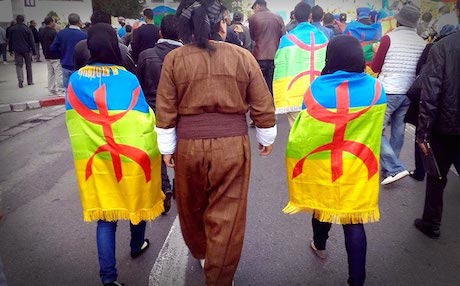KURDISH-BERBER SOLIDARITY
In Algeria, Arab-Berber Conflict Recalls Plight of Kurds

by Harvey Morris, Rudaw
The results of Algeria's choreographed elections were announced April 19, with the re-election of long-ruling Abdelaziz Bouteflika a foregone conclusion. The opposition, including a Berber "provisional government" that has been declared in the Kabylia region of the country's east, boycotted the poll. This piece ran before the elections on the Kurdish news site Rudaw. —World War 4 Report
LONDON — It is gearing up to be an abrasive election campaign in Algeria, where pre-poll tensions have already flared into inter-communal violence involving Arabs and Berbers, whose history of persecution and cultural marginalization recalls that of the Kurds. Thousands of police were this week deployed in the city of Ghardaia, 350 miles south of Algiers, after the latest in a series of clashes between Arab and Berber youths left three dead, 200 injured and shops burned and destroyed.
Reports from the region, a UNESCO World Heritage site in which the two communities have lived side-by-side for a thousand years, did not identify a specific motive for the latest violence. However, there was speculation that an influx of Arabs to the majority-Berber region might be an element in the rising tension.
Other theories point to possible property disputes, political machinations among the security forces, and even a spill-over from the illicit North African drug trade.
The unrest comes ahead of a presidential election campaign that officially opens on [March 23] in which the ageing President Abdelaziz Bouteflika has sparked widespread political dissent by announcing he will stand for a fourth term. The 77-year-old Bouteflika has rarely been seen in public since suffering a stroke last year. However, with the backing of the ruling National Liberation Front and sections of the army, he is widely tipped to beat a divided opposition to secure a further five-year term. Five other candidates are also standing.
The country over which he has presided, since the final years of a bloody civil war against Islamists that ended in 2002, includes one in four people who identify themselves as Berber, or Amazigh, in their language and cultural traditions. There is an even higher proportion of Berbers in neighboring Morocco and smaller communities in Tunisia, Libya and other regions of North Africa.
They were prominent in the Algerian war against the colonial French and, in Libya, they were among the first to join the struggle to oust Muammar Gaddafi and many there are now demanding self-rule.
Like the Kurds, the Berbers are an indigenous group that long predates the arrival of Islam and Arabisation.
The parallels are not lost on the Berbers. The pro-independence Movement for Self-Determination in Kabylia, the mountainous Berber region of Northern Algeria, condemned the tendency of the international community to “turn its back on oppressed peoples” when it denounced the killings in Paris last year of three activists of the Kurdistan Workers' Party (PKK).
And the self-styled Kabylia Provisional Government in exile last year issued a statement supporting Kurdish autonomy in Syria. "Like the Kurds of Turkey, Iran and Iraq, the Kurds of Syria who have suffered so much from Syrian oppression, also aspire to an independent Kurdistan," it said.
In neighboring Morocco, Berber student demonstrators carried Kurdish flags during protests in 2012 and Kurds responded by hoisting the Berber flag in Syria.
As with Kurds, many of the demands of Berbers have been focused on linguistic and cultural recognition in Arab-dominated states. Both have also called for greater democratization within a secular framework.
In 1980, in a period that became known as the Berber Spring, several months of demonstrations demanded that the Berber language, Tamazight, be made an official language in Algeria. Thousands of protestors were detained.
In 2001, similar demands and repression by the security forces led to bloody riots that left 50 dead. As part of an agreement to settle that round of unrest, President Bouteflika agreed to designate Tamazight as a national language, although not an official one.
The protestors had been demanding the reversal of a 1998 law that mandated the exclusive use of Arabic in public life. Berbers saw the move as an attempt to appease Islamists. Ironically, that law was passed under President Liamine Zeroual, himself a Berber. The former general this week issued an open letter that added his voice to those opposing a fourth term for President Bouteflika and in which he urged a change of leadership.
Divisions over the forthcoming election have raised tensions beyond the Berber homelands, prompting demonstrations in the capital and elsewhere.
In Ghardaia, meanwhile, the authorities' priority appears to be on calming Arab-Berber conflict as the election day approaches.
———
This story first ran March 22 on Rudaw.
Photo: Kawa Botani, a Kurdish activist from Duhok, Iraq, joined Amazigh (Berber) protests in Morocco in January, demanding cultural rights. Credit: Kawa Botani
From our Daily Report:
Algeria: Berbers join call for election boycott
World War 4 Report, April 17, 2014
Syria: Nusra Front cleanses Kurds
World War 4 Report, Aug. 19, 2013
'Dark forces' in assassination of Kurdish leaders
World War 4 Report, Nov. 1, 2013
See also:
ALGERIA: DEMOCRACY CRUMBLING?
Islamist Violence and State Legitimacy
by Kanishk Tharoor, Madrid11.net
World War 4 Report, June 2007
EASTERN ANATOLIA: IRAQ'S NEXT DOMINO
"Greater Kurdistan" Ambitions Could Spark Regional War
by Sarkis Pogossian, World War 4 Report
World War 4 Report, November 2005
—————————-
Reprinted by World War 4 Report, April 26, 2014

















Recent Updates
1 day 4 hours ago
1 day 5 hours ago
1 day 5 hours ago
1 day 5 hours ago
1 day 5 hours ago
1 day 6 hours ago
1 day 6 hours ago
1 day 6 hours ago
1 day 7 hours ago
1 day 8 hours ago